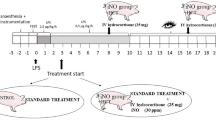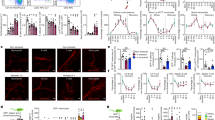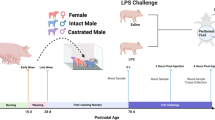Abstract
Low-dose hydrocortisone (LDHC) therapy modulates inflammatory responses in adults and improves outcomes in some septic adults and neonates, but its immunologic effects have not been evaluated in neonates. The objective of this study was to evaluate effects of LDHC therapy on ex vivo immune function in neonatal horses (foals). We hypothesized that LDHC treatment would dampen proinflammatory responses without impairing neutrophil function. Hydrocortisone (1.3 mg/kg/d i.v.) was administered to foals in a tapering 3.5 d course. Peripheral blood leukocytes were collected from foals before, during, and after hydrocortisone treatment. A separate group of age-matched untreated foals served as controls. Endotoxin-induced peripheral blood mononuclear cell gene expression of inflammatory cytokines was measured by real-time quantitative RT-PCR. Neutrophils were incubated with labeled, killed Staphylococcus aureus or Escherichia coli for assessment of phagocytosis, and with phorbol myristate acetate, zymosan, or endotoxin for measurement of reactive oxygen species (ROS) production. Neutrophil phagocytosis and ROS production were similar in both groups. Foals receiving hydrocortisone had significantly decreased endotoxin-induced expression of TNF-α, IL-6, IL-8, and IL-1β. These data suggest that this LDHC treatment regimen ameliorates endotoxin-induced proinflammatory cytokine expression in neonatal foals without impairing innate immune responses needed to combat bacterial infection.
Similar content being viewed by others
Log in or create a free account to read this content
Gain free access to this article, as well as selected content from this journal and more on nature.com
or
Abbreviations
- CIRCI:
-
critical illness-related corticosteroid insufficiency
- HPA:
-
hypothalamic-pituitary-adrenal
- LDHC:
-
low-dose hydrocortisone
- PBMC:
-
peripheral blood mononuclear cell
- PMA:
-
phorbol myristate acetate
- RAI:
-
relative adrenal insufficiency
- ROS:
-
reactive oxygen species
REFERENCES
Marik PE 2007 Mechanisms and clinical consequences of critical illness associated adrenal insufficiency. Curr Opin Crit Care 13: 363–369
Aneja R, Carcillo J 2007 What is the rationale for hydrocortisone treatment in children with infection-related adrenal insufficiency and septic shock. Arch Dis Child 92: 165–169
Fernandez EF, Watterberg KL 2009 Relative adrenal insufficiency in the preterm and term infant. J Perinatol 29: S44–S49
Marik PE 2009 Critical illness-related corticosteroid insufficiency. Chest 135: 181–193
Annane D, Maxime V, Ibrahim F, Alvarez J, Abe E, Boudou P 2006 Diagnosis of adrenal insufficiency in severe sepsis and septic shock. Am J Respir Crit Care Med 174: 1319–1326
Pizarro CF, Troster EJ, Damiani D, Carcillo JA 2005 Absolute and relative adrenal insufficiency in children with septic shock. Crit Care Med 33: 855–859
Gold JR, Perkins GA, Erb HN, Ainsworth DM 2007 Cytokine profiles of peripheral blood mononuclear cells isolated from septic and healthy neonatal foals. J Vet Intern Med 21: 482–488
Harris MC, D'Angio CT, Gallagher PR, Kaufman D, Evans J, Kilpatrick L 2005 Cytokine elaboration in critically ill infants with bacterial sepsis, necrotizing enterocolitis, or sepsis syndrome: correlation with clinical parameters of inflammation and mortality. J Pediatr 147: 462–468
Wang H, Ma S 2008 The cytokine storm and factors determining the sequence and severity of organ dysfunction in multiple organ dysfunction syndrome. Am J Emerg Med 26: 711–715
Haddad JJ, Saadé NE, Safieh-Garabedian B 2002 Cytokines and neuro-immune-endocrine interactions: a role for the hypothalamic-pituitary-adrenal revolving axis. J Neuroimmunol 133: 1–19
Ng PC, Li K, Wong RP, Chui K, Wong E, Li G, Fok TF 2003 Proinflammatory and anti-inflammatory cytokine responses in preterm infants with systemic infections. Arch Dis Child Fetal Neonatal Ed 88: F209–F213
Soni A, Pepper G, Wyrwinski P, Ramirez N, Simon R, Pina T, Gruenspan H, Vaca C 1995 Adrenal insufficiency occurring during septic shock: incidence, outcome, and relationship to peripheral cytokine levels. Am J Med 98: 266–271
Annane D, Bellissant E, Bollaert P, Briegel J, Confalonieri M, De Gaudio R, Keh D, Kupfer Y, Oppert M, Meduri G 2009 Corticosteroids in the treatment of severe sepsis and septic shock in adults: a systematic review. JAMA 301: 2362–2375
Keh D, Sprung C 2004 Use of corticosteroid therapy in patients with sepsis and septic shock: an evidence based review. Crit Care Med 32: S527–S533
Minneci PC, Deans KJ, Eichacker PQ, Natanson C 2009 The effects of steroids during sepsis depends on dose and severity of illness: an updated meta-analysis. Clin Microbiol Infect 15: 308–318
Marik PE, Pastores SM, Annane D, Meduri GU, Sprung CL, Arlt W, Keh D, Briegel J, Beishuizen A, Dimopoulou I, Tsagarakis S, Singer M, Chrousos GP, Zaloga G, Bokhari F, Vogeser M, American College of Critical Care Medicine 2008 Recommendations for the diagnosis and management of corticosteroid insufficiency in critically ill adult patients: consensus statements from an international task force by the American College of Critical Care Medicine. Crit Care Med 36: 1937–1949
Watterberg KL, Gerdes JS, Cole CH, Aucott SW, Thilo EH, Mammel MC, Couser RJ, Garland JS, Rozycki HH, Leach CL, Backstrom C, Shaffer ML 2004 Prophylaxis of early adrenal insufficiency to prevent bronchopulmonary dysplasia: a multicenter trial. Pediatrics 114: 1649–1657
Quintos JB, Boney CM 2010 Transient adrenal insufficiency in the premature newborn. Curr Opin Endocrinol Diabetes Obes 17: 8–12
Fernandez EF, Montman R, Watterberg KL 2008 ACTH and cortisol response to critical illness in term and late preterm newborns. J Perinatol 28: 797–802
Ng PC, Lam CW, Fok TF, Lee CH, Ma KC, Chan IH, Wong E 2001 Refractory hypotension in preterm infants with adrenocortical insufficiency. Arch Dis Child Fetal Neonatal Ed 84: F122–F124
Soliman AT, Taman KH, Rizk MM, Nasr IS, Alrimawy H, Hamido MS 2004 Circulating adrenocorticotropic hormone (ACTH) and cortisol concentration in normal, appropriate-for-gestational-age newborns versus those with sepsis and respiratory distress: cortisol response to low-dose and standard-dose ACTH tests. Metabolism 53: 209–214
Tantivit P, Subramanian N, Garg M, Ramanathan R, deLemos RA 1999 Low serum cortisol in term newborns with refractory hypotension. J Perinatol 19: 352–357
Watterberg KL 2004 Adrenocortical function and dysfunction in the fetus and neonate. Semin Neonatol 9: 13–21
Hart KA, Heusner GL, Norton NA, Barton MH 2009 Hypothalamic-pituitary-adrenal axis assessment in healthy term neonatal foals utilizing a paired low dose/high dose ACTH stimulation test. J Vet Intern Med 23: 344–351
Silver M, Fowden A 1994 Prepartum adrenocortical maturation in the fetal foal: responses to ACTH. J Endocrinol 142: 417–425
Silver M, Fowden A, Know J, Ousey J, Franco R, Rossdale P 1987 Sympathoadrenal and other responses to hypoglycaemia in the young foal. J Reprod Fertil Suppl 35: 607–614
Silver M, Ousey J, Dudan F, Fowden A, Know J, Cash R, Rossdale P 1984 Studies on equine prematurity 2: post natal adrenocortical activity in relation to plasma adrenocorticotrophic hormone and catecholamine levels in term and premature foals. Equine Vet J 16: 278–286
Cohen ND 1994 Causes of and farm management factors associated with disease and death in foals. J Am Vet Med Assoc 204: 1644–1651
Hart KA, Slovis NM, Barton MH 2009 Hypothalamic-pituitary-adrenal axis dysfunction in hospitalized neonatal foals. J Vet Intern Med 23: 901–912
Morris DD, Moore JN 1991 Tumor necrosis factor activity in serum from neonatal foals with presumed septicemia. J Am Vet Med Assoc 199: 1584–1589
Hart KA, Dirikolu L, Ferguson D, Norton N, Barton M . Daily endogenous cortisol production and hydrocortisone pharmacokinetics in adult horses and neonatal foals. Am J Vet Res in press
Briegel J, Kellermann W, Forst H, Haller M, Bittl M, Hoffmann G, Buchler M, Uhl W, Peter K 1994 Low-dose hydrocortisone infusion attenuates the systemic inflammatory response syndrome. The Phospholipase A2 Study Group. Clin Investig 72: 782–787
Lamberts SW, Bruining HA, de Jong H 1997 Corticosteroid therapy in severe sepsis. N Engl J Med 337: 1285–1292
Hart KA, Ferguson DC, Heusner GL, Barton MH 2007 Synthetic adrenocorticotropic hormone stimulation tests in healthy neonatal foals. J Vet Intern Med 21: 314–321
Reimers TJ, Salerno VJ, Lamb SV 1996 Validation and application of solid-phase chemiluminescent immunoassays for diagnosis of endocrine diseases in animals. Comp Haematol Int 6: 170–175
Singh AK, Jiang Y, White T, Spassova D 1997 Validation of nonradioactive chemiluminescent immunoassay methods for the analysis of thyroxine and cortisol in blood samples obtained from dogs, cats, and horses. J Vet Diagn Invest 9: 261–268
Donovan DC, Jackson CA, Colahan PT, Norton NN, Clapper JL, Moore JN, Hurley DJ 2007 Assessment of exercise-induced alterations in neutrophil function in horses. Am J Vet Res 68: 1198–1204
Sun WC, Moore JN, Hurley DJ, Vandenplas ML, Linden J, Cao Z, Murray TF 2008 Adenosine A2A receptor agonists inhibit lipopolysaccharide-induced production of tumor necrosis factor-alpha by equine monocytes. Vet Immunol Immunopathol 121: 91–100
Figueiredo MD, Salter CE, Andrietti AL, Vandenplas ML, Hurley DJ, Moore JN 2009 Validation of a reliable set of primer pairs for measuring gene expression by real-time quantitative RT-PCR in equine leukocytes. Vet Immunol Immunopathol 131: 65–72
Figueiredo MD, Vandenplas ML, Hurley DJ, Moore JN 2009 Differential induction of MyD88- and TRIF-dependent pathways in equine monocytes by Toll-like receptor agonists. Vet Immunol Immunopathol 127: 125–134
Heller AR, Heller SC, Borkenstein A, Stehr SN, Koch T 2003 Modulation of host defense by hydrocortisone in stress dose during endotoxemia. Intensive Care Med 29: 1456–1463
Keh D, Boehnke T, Weber-Cartens S, Schulz C, Ahlers O, Bercker S, Volk H-D, Doecke W-D, Falke K, Gerlach H 2003 Immunologic and hemodynamic effects of “low-dose” hydrocortisone in septic shock. Am J Respir Crit Care Med 167: 512–520
Kaufmann I, Briegel J, Schliephake F, Hoelzl A, Chouker A, Hummel T, Schelling G, Thiel M 2008 Stress doses of hydrocortisone in septic shock: beneficial effects on opsonization-dependent neutrophil functions. Intensive Care Med 34: 344–349
Briegel J, Forst H, Haller M, Schelling G, Kilger E, Kuprat G, Hemmer B, Hummel T, Lenhart A, Heyduck M, Stoll C, Peter K 1999 Stress doses of hydrocortisone reverse hyperdynamic septic shock: a prospective, randomized double-blind single center study. Crit Care Med 27: 723–732
Acknowledgements
We thank Lorelei Jones, Kari Anderson, Dr. Gary Heusner, Dr. Greg Queen, and the students who assisted with sampling; Londa Berghaus, Shay Bush, Kate Hurley, Natalie Norton, Denise Pope, and Caroline Salter for technical assistance; and Dr. Roy Berghaus for statistical consultation.
Author information
Authors and Affiliations
Corresponding author
Additional information
Supported by grants from the National Institutes of Health (GM086003), the Grayson Jockey Club Research Foundation, and the American Quarter Horse Foundation.
Portions of this work were presented in abstract form at the American College of Veterinary Internal Medicine Annual Forum, Anaheim, California, June 9–12, 2010.
Rights and permissions
About this article
Cite this article
Hart, K., Barton, M., Vandenplas, M. et al. Effects of Low-Dose Hydrocortisone Therapy on Immune Function in Neonatal Horses. Pediatr Res 70, 72–77 (2011). https://doi.org/10.1203/PDR.0b013e31821b502b
Received:
Accepted:
Issue date:
DOI: https://doi.org/10.1203/PDR.0b013e31821b502b
This article is cited by
-
COVID-19 and corticosteroids: a narrative review
Inflammopharmacology (2022)



